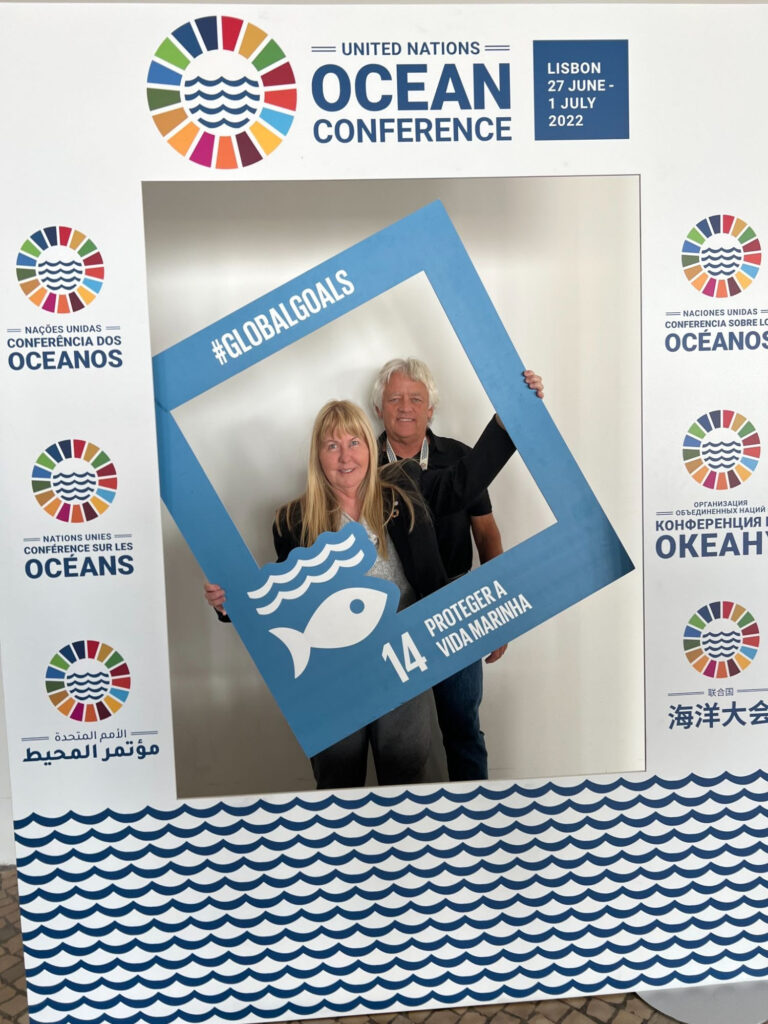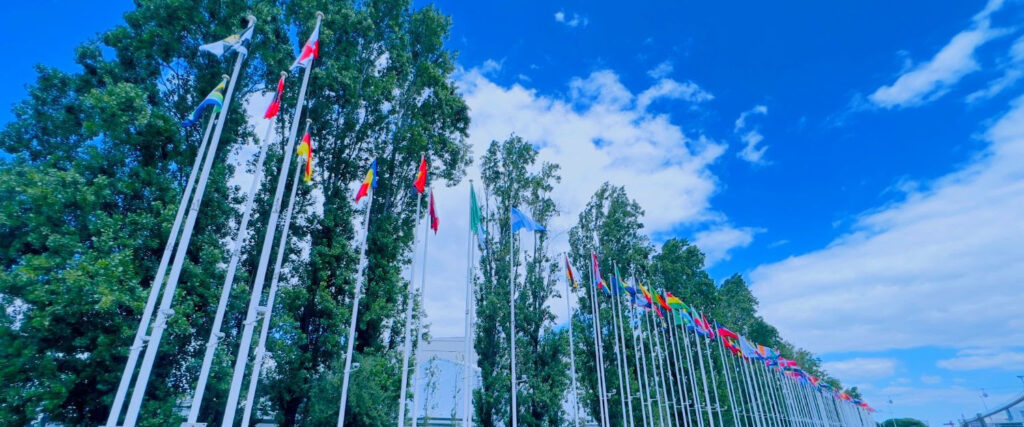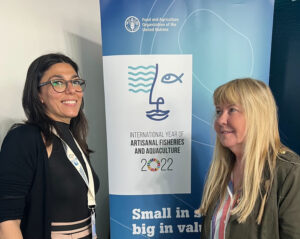What Happened Last Week
Last week, our Sea Save Foundation delegation attended the United Nations Oceans Conference (UNOC). On the ground in Lisbon, Portugal we were among hundreds of decision-making delegates from around the world. The conference was hosted by Portugal and Kenya and was one of the first gatherings of this caliber that has convened post-COVID. Opening Ceremony Video Available Here.

“The normal pomp and circumstance were still integrated, but there was a clear shift in rhetoric and urgency. Island nations in particular spoke with great exigency. Many delegates referred to three principal issues: plastic pollution contaminating food supply, ocean rise reclaiming livable space, and the disappearance of marine flora and fauna required to feed their citizens,” reflected Sea Save Director, Georgienne Bradley.
Parties reported on progress made, renewed political and financial commitments, and addressed issues related to the high seas. Some delegates also described how COVID and the war in Ukraine had delayed prior commitments.
The conference focused on increasing ocean actions based on science and innovation leveraging stocktaking and partnerships. This conference resulted in the announcement of over 300 commitments including about 50 high-level pledges, raising over $1 billion in financial promises by world leaders to make needed changes.
The Second UN Ocean Conference: A Wave of Triumphs
The conference was postponed for two years due to the COVID-19 pandemic and focused on assessing progress made toward SDG 14 goals and strategizing progress that can be made for the future 2030 timeline goal. In addition to the SDG mandates, more than 150 member states committed to the protection of at least 30 percent of the world’s global oceans through conservation including marine protected areas and other measures by 2030.

More than 300 voluntary commitments were made by nations and organizations around the world, including:
- The Protecting Our Planet Challenge, leveraging money collected by five philanthropies, will invest at least $1 billion to support the creation, expansion, and management of marine protected areas by 2030.
- The European Investment Bank will extend an additional 150 million Euros across the Caribbean Region as part of the Clean Oceans Initiative to improve climate resilience, water management, and solid waste management.
- The Latin American Development Bank committed $1.2 billion to support regional ocean projects.
- Portugal committed to ensuring that 100 percent of their marine area is assessed and in a ‘Good Environmental State.’ They will also classify 30% of their waters as national marine areas by 2030.
- Kenya is developing a national, inclusive, blue economy action plan that is inclusive and multi-stakeholder-oriented to combat sea-based plastic pollution.
- India committed to a Coastal Clean Seas Campaign and will work toward a ban on single-use plastics.
- The Alliance of Small Island Developing States (AOSIS) launched the Declaration for the Enhancement of Marine Scientific Knowledge, Research Capacity, and Transfer of Marine Technology to Small Island Developing States.
- Panama committed to protecting 40 percent of its marine surface area by 2030 – besting the 2030 agreement by a full 10 percent.
- China committed to launching more than 30 marine ecological preservation and restoration projects over five years and to assisting developing countries to reach their goals.
- The United States, the United Kingdom, and Canada launched an Illegal, Unreported, Unregulated (IUU) Fishing Action Alliance aimed at increasing ambition and momentum in the fight against IUU fishing and asking Alliance signatories to “take urgent action to improve the monitoring, control, and surveillance of fisheries, increase transparency in fishing fleets and in the seafood market, and build new partnerships that will hold bad actors accountable.”
- The United States also announced a lineup of commitments during UNOC (more on the US announcement in our next newsletter). The United States is emphasizing its full commitment to combating IUU Fishing and supporting sustainable fisheries. They committed to protecting and restoring coral reefs and NOAA Administrator Dr. Rick Spinrad signed a memorandum of understanding in conjunction with UNOC that formalized U.S. participation in the multinational and cross-sectoral Nippon Foundation-General Bathymetric Chart of the Oceans (GEBCO) Seabed 2030 Project, which aims to fully map the world’s ocean floor by 2030. In addition, special Presidential Envoy for Climate John Kerry announced the United States will join the International Alliance to Combat Ocean Acidification.

“Our Ocean, Our Future, Our Responsibility” Resolution
A new, groundbreaking resolution was adopted at the Conference – “Our Ocean, Our Future, Our Responsibility.” The new declaration reaffirms past commitments and strongly emphasizes that oceans are fundamental to life on our planet and to our future. The new resolution also integrates both the 2015 Paris Climate Agreement and the 2021 Glasgow Climate Pact into the call to action.
In an unprecedented gesture, delegates jointly expressed regret at the “collective failure” to achieve several 2020 targets, and reaffirmed their commitment to achieving targets as soon as possible.
The agreement calls for “an ambitious, balanced, practical, effective, robust, and transformative post-2020 global biodiversity framework for adoption at CBD COP 15” that would include the conservation, governance, and financing commitments made on this issue by member states. The final declaration also:
- Welcomed the UNEA decision to develop an international agreement on plastic pollution;
- Affirmed the conservation and sustainable use of the world’s oceans focused on post-COVID pandemic resilience;
- Declared the UN Decade of Ocean Science for Sustainable Development from 2021 to 2030 as highly important; and
- Recognized the need to reach an international high seas agreement.
Delegates encouraged the UN General Assembly to pass the declaration at its 77th meeting in New York in September.
Was the United Nations Ocean Conference 2022 a Success?

Are the Ocean Conference and related Sustainable Development Goal #14 efforts really moving the needle and making a difference? From the view at the conference, the answer is a resounding yes! Momentum on oceans and their link to biodiversity, climate regulation, and their importance to the global economy is building this year. It is time for the world to come together on these issues to chart the future of our oceans. “After working with national delegates during the conference,” Sea Save Director Georgienne Bradley reflected, “Clearly, nations most dependent upon the oceans are feeling the future and they are raising their voices. Loudly. Our work to protect oceans because they are beautiful and because we are the stewards of life below the water might be realized as we are joined by increasing numbers of nations whose residents are finally seeing and feeling the effects of unhealthy oceans.”
For more information on the Sustainable Development Goals and how climate change affects oceans, click here. Look for our next newsletter on the US commitments and announcements coming soon!




